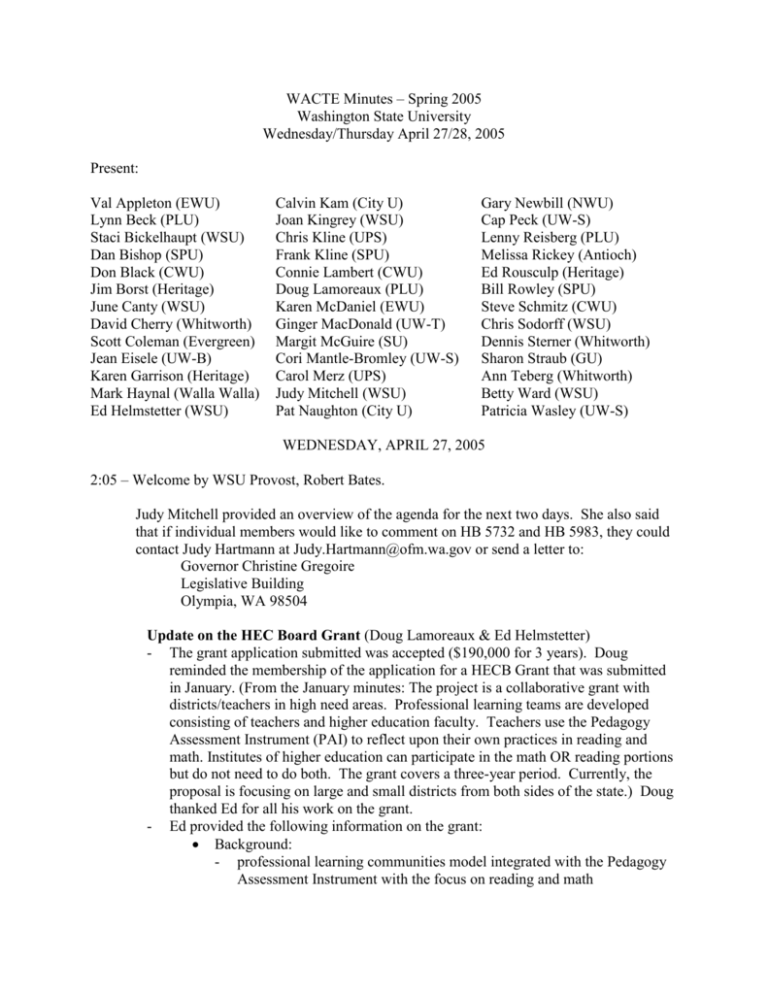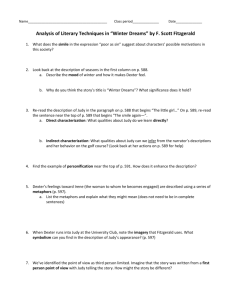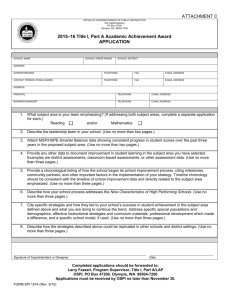April - wacte
advertisement

WACTE Minutes – Spring 2005 Washington State University Wednesday/Thursday April 27/28, 2005 Present: Val Appleton (EWU) Lynn Beck (PLU) Staci Bickelhaupt (WSU) Dan Bishop (SPU) Don Black (CWU) Jim Borst (Heritage) June Canty (WSU) David Cherry (Whitworth) Scott Coleman (Evergreen) Jean Eisele (UW-B) Karen Garrison (Heritage) Mark Haynal (Walla Walla) Ed Helmstetter (WSU) Calvin Kam (City U) Joan Kingrey (WSU) Chris Kline (UPS) Frank Kline (SPU) Connie Lambert (CWU) Doug Lamoreaux (PLU) Karen McDaniel (EWU) Ginger MacDonald (UW-T) Margit McGuire (SU) Cori Mantle-Bromley (UW-S) Carol Merz (UPS) Judy Mitchell (WSU) Pat Naughton (City U) Gary Newbill (NWU) Cap Peck (UW-S) Lenny Reisberg (PLU) Melissa Rickey (Antioch) Ed Rousculp (Heritage) Bill Rowley (SPU) Steve Schmitz (CWU) Chris Sodorff (WSU) Dennis Sterner (Whitworth) Sharon Straub (GU) Ann Teberg (Whitworth) Betty Ward (WSU) Patricia Wasley (UW-S) WEDNESDAY, APRIL 27, 2005 2:05 – Welcome by WSU Provost, Robert Bates. Judy Mitchell provided an overview of the agenda for the next two days. She also said that if individual members would like to comment on HB 5732 and HB 5983, they could contact Judy Hartmann at Judy.Hartmann@ofm.wa.gov or send a letter to: Governor Christine Gregoire Legislative Building Olympia, WA 98504 Update on the HEC Board Grant (Doug Lamoreaux & Ed Helmstetter) - The grant application submitted was accepted ($190,000 for 3 years). Doug reminded the membership of the application for a HECB Grant that was submitted in January. (From the January minutes: The project is a collaborative grant with districts/teachers in high need areas. Professional learning teams are developed consisting of teachers and higher education faculty. Teachers use the Pedagogy Assessment Instrument (PAI) to reflect upon their own practices in reading and math. Institutes of higher education can participate in the math OR reading portions but do not need to do both. The grant covers a three-year period. Currently, the proposal is focusing on large and small districts from both sides of the state.) Doug thanked Ed for all his work on the grant. - Ed provided the following information on the grant: Background: - professional learning communities model integrated with the Pedagogy Assessment Instrument with the focus on reading and math - teams consisting of university and school district personnel training provided by NWREL with two schools (one identified as highneed and one not identified as high-need) - Edith Gummer will work with supervisors and teachers to develop, field test, and revise PAI training materials - funds are also available for development of videotapes - Summer 05 – work with people who plan to be involved - Fall 05 meeting will include a discussion of other WACTE institutions that would like to be involved in the project. Pedagogy Assessment Instrument: - pilot training will occur in the Fall - reliability and validity studies are still being completed by NWREL; findings will be reported to Doug & Ed - there are no changes to the PAI for academic year 2005-06 - Recommendation: Have the instrument approved by the State Board of Education prior to January 2006 Report on ABCTE (Frank Kline) The Executive Committee met with Jan Hill (Lewis & Clark) and Jeanne Christiansen (University of Idaho) to discuss the American Board for Certification of Teacher Excellence (ABCTE) certification that has been approved in Idaho. Candidates are required to have a bachelor’s degree and a background check. The candidate pays a $500.00 fee and a “needs assessment” is completed – what does the candidate need to do to be successful on the exam? Coursework is available on-line as well as self directed readings or course options. The candidate takes exams on content and pedagogy (there is no requirement for the application of skills). Idaho recognizes the ABCTE Certificate as an interim certificate. Upon successfully completing the exams, the candidate takes two additional courses (diversity and technology) and then applies to the Idaho State Department of Education for a 3-year interim certificate during which time s/he needs to complete Idaho requirements for an endorsement area. There are currently 17 ABCTE candidates who have applied for Idaho Certificates – no data has been collected on the success of these teachers. The ABCTE certificate is a possible option for rural districts to gain “highly qualified teachers.” If other states accept the ABCTE “Passport,” it is considered as an institutional recommendation. Current endorsements through ABCTE are available in Elementary Education, Math, and English/Language Arts with Special Education and others in the near future. Washington is currently protected by the need to check the “state approved teacher preparation program” box on the certificate application – ABCTE would not qualify as an approved teacher preparation program since application for certification would occur at the state level and not through institution. Possible dual meeting next spring with WACTE and IACTE members attending. Judy discussed this possibility with the membership. General consensus was to have a combined late afternoon meeting with an evening function, but to keep the two business meetings separate. Professional Educators Standards Board (Jennifer Wallace & Dennis Sterner) Background was provided on the PESB The PESB is currently 5 years old Members have 4 year terms, last year members were reappointed at staggered terms There are 21 members, including teachers, administrators, paraprofessionals, and ESAs - Currently WACTE has three members on the PESB and all three positions will turn over in the next three years. WACTE members were asked to think about who may be appropriate to serve next. Meetings are held over two days every other month. - Terry Bergeson is a non-voting member Jennifer stated that it was a great idea having a WACTE liaison to the PESB (Frank Kline). Jennifer distributed a copy of SB 5732 that transfers authority for educator preparation and certification from the State Board of Education to the PESB January 1, 2006. She encouraged WACTE members to voice recommendations and concerns regarding teacher preparation and certification to the PESB. Members were also encouraged to attend PESB Meetings. The next three meetings are: May 18-19 in Spokane July 21-22 in Olympia September 21-22 in Yakima If SB 5732 is signed by the governor, as of January 1st: - PESB will be the policy making body - OSPI will be the implementing body and oversee evaluation, professional development, and WACs. There will be no structural changes to OSPI. - SBE will no longer have responsibility for professional education and certification, but will oversee P-12 issues. The SBE as is will be abolished and members re-elected under the new rules. They will also pick up the responsibilities of the A+ Commission. Over the next six months, the PESB will conduct a systematic analysis of professional education and certification (strengths and weaknesses in specific areas). This information will be used as a foundation for future policymaking. Alternative routes to certification will be included in the analysis. The PESB would like to hear from WACTE members regarding strengths, weaknesses, barriers, and recommendations regarding policy areas as they shift from an advisory to governance/rule making board. Many questions and concerns were discussed regarding the future relationship of WACTE with the PESB. Judy emphasized that WACTE and PESB need to work together to build a process that oversees our own profession – by building the process together, both organizations can take ownership. Additionally, Judy asked for assurance that WACTE would be involved and invited to future meetings and allowed to help in the process since the change will impact institutions of higher education. Karen McDaniel reported on the NWATE Conference held April 7 & 8 in Spokane. Conference papers are now on the website (www.nwate.org). This year a symposium format was used which was very successful. Karen encouraged members to bring graduate students to the conference next year. 5:00 – Reception at the Museum of Art 6:00—Dinner Honoring our Past Presidents at Todd Dining Hall. Past Presidents attending included: Jimmy Applegate, Dennis Sterner, Carol Merz, Margit McGuire, and Doug Lamoreaux. THURSDAY, APRIL 28, 2005 8:30 – Hearty sit-down breakfast in the Compton Union Building (CUB). 9:15 – Judy Mitchell called the meeting to order. She debriefed the events from last evening and previewed today’s agenda. Val Appleton provided a draft of the guidelines for the Elementary Education DTA that included: timeline of work, charge to the group, background, working group members, and a draft of the proposal. The El. Ed. pathway will be completed this summer. Concerns are algebra and pre-college readiness in math. A pre-professional introduction to education and life span course were approved to be taken at the community college level. Registrars have looked at the DTA to match community college transfer courses to basic and breadth requirements. WACTE agreed that moving the passing of the WEST-B to the Community college level was a good move Karen McDaniel stated that the Community College transfer group was also working on a seamless pathway from high school to community college to higher education. Judy congratulated Val and the committee on the progress and direction. Pedagogy Assessment Instrument (PAI) A brief review of the discussion from the January meeting occurred identifying some weak areas in the instrument. The PAI was designed as an observation tool therefore some standards may not be present. Inter-rater reliability is needed to determine the strength of the instrument. Doug and Ed contacted Michael at NWREL with a question about bubblesheets being received at institutions. Ed said the bubblesheets are to be completed for all PAI candidates. This is summary information for the PAI, they are to be anonymous with no consequences for any areas failed. The information will be used to inform programs of items not passed. The report is due out the end of July. OSPI – Arlene Hett & Andy Griffin Arlene thanked Judy Mitchell, Frank Kline, and Carol Merz for attending the legislative session. She stated that the change in governance from SBE to PESB happened quickly although conversations have occurred over several years. WACTE members will continue to work with OSPI in the same way. Arlene said she attends PESB meetings and there have been excellent discussions around education in the state. Andy also said that the PESB is a great board. He emphasized that WACTE is producing leaders and WACTE’s voice needs to be heard – that in the political world, voices are easily set aside. Andy suggested that WACTE: 1. Invite legislators to our campuses -- He said he went to hearing after hearing and people did not know what teacher preparation consisted of on campuses in Washington State. He recommended that cabinet members be on the OSPI site teams in order to learn more about teacher education. He suggested that we “demystify” ourselves and bring OSPI cabinet members and legislators to our campuses prior to the legislative session. 2. Find out how PESB higher education representatives are chosen. His interpretation (from section 202 #8 on the third page of the handout) is that representatives are chosen from a list of qualified nominees. That WACTE has three representatives on the PESB whose responsibility it is to represent the organization and his perception is that the WACTE voice has not been heard. 3. Find out how the new governance system will impact WACTE. OSPI (Arlene Hett) OSPI is the implementation branch for higher education. Arlene stated that WACTE, as a group, does not express what we do and therefore higher education ends up at the bottom She suggested that we begin building relationships. Suggestion: Develop a booklet that highlights what each institution is doing. Include students served and the impact we have on and with K-12 schools. Then send it to every legislator. This year a letter was sent to every legislator with the web address of the WACTE directory. Discussion: 1. Send the following information to the PESB and include in the booklet: Students served – in-state and out-of-state Elimination of the achievement gap – how are we attacking it? Outcomes Positive impact on student learning Published and disseminated evidence What we are doing to address unique needs 2. Send a proposal to OSPI for supplemental services for students to work with other students who need extra help (addressing the unique needs of the state). 3. Become members of the three Assessment Committees that look at Positive Impact on Student Learning, Dispositions, and Data Management NCATE: Invite Donna Gollnick (from NCATE) and others who have been successful in various areas of assessment to share their format and present data. An NCATE partnership committee will be formed. Program Review: What is OSPI doing in the areas of endorsement? They are reviewing Math first, but will eventually review all endorsement areas. Arlene said that we need to do a better job of collecting data to demonstrate that our programs are “terrific!” She also stated that the WEST-E is not strongly correlated to content in all areas. She will continue working with the PESB for “one voice and one message.” Lunch with Eastside PEAB members Washington Education Association (Charles Hasse & Jim Meadows) Charles Hasse stated that Washington is doing well in regard to national trends, and that WEA continues to invest in the state. They are proposing to members to invest in a program focusing on school funding with progressive taxes being a possibility. Charles closed by saying that WEA looks forward to working collectively with WACTE on educational issues in the state, including the Professional Certificate. Jim Meadows coordinates the Professional Certificate Program and Professional Development for WEA. They are now doing a total of 16 “road shows” to provide current, accurate information about adding endorsements, testing, differences in the Professional Certificate, and National Board Certification. A survey was sent to WEA members concerning the Professional Certificate, and anecdotal data was quantified. Copies of results from the January survey were distributed. The survey was administered both on-paper and on-line to determine baseline data prior to Fall 04 and prior to proposed changes in Professional Certification being implemented. Data can be disaggregated by institution if requested, but data won’t be reported if the sample is below ten respondents. Contact Jim if you are interested. WEA’s stand on the Professional Certificate is: It’s an improved model over the previous 45 credits with good elements It has a good premise It would be better if it was supported with more funding, mentoring, and resources Jim provided a brief overview of the April 6th meeting that involved WEA lobbyists, the Professional Certificate task force, and representatives from higher education. He stated that there is “an incredible spectrum of beliefs” on this issue, but not one collective set of beliefs. There has been frustration aimed at higher education by WEA members concerning the perception that institutions are not following the legislative mandate for the initial PC program and the revisions, and frustration aimed at WEA by WACTE members. Jim stated that frustration is actually not focused toward WACTE member institutions, and that WEA views higher education as a partner in this process with common concerns, such as efforts to decentralize teaching, and not changing the WESTB cut scores. Suggestions: Keep communication channels open and continue conversations. For example, a salary bump for teachers finishing the PC is currently “off the table” and together the two organizations may be able to positively impact that issue. Talk about the WEA/WACTE partnership with each other and at other meetings – remind people of the partnership. Include a WEA update on the WACTE agenda (Margit McGuire is the current WACTE liaison to WEA). During construction of position statements, check with each other to ask “what do you think about this?” Have position statements ready to distribute Professional Certificate (Mary Jo Larsen, OSPI) Mary Jo Larsen has been at OSPI for four months. Previously she was at PLU working with the Professional Certificate (PC) Program and fostering working relationships with school districts. She thanked all the PC program administrators for their work. OSPI has also been surveying teachers in PC programs. She stated that the current trend is that the further teachers get into the program, the more positive their comments become. Changes in the program include: rubrics changed into descriptions of the process, common PC handbook that will be available this summer, and toolkits developed for PC seminars. There is currently a common language and common system, but we all need to communicate the big picture with details of requirements to allay misperceptions of the PC program – to reinforce that it is a job-embedded process. The length of the Residency Certificate has been adjusted from five to seven years to allow candidates to complete the two year provisional status and still have five years to complete a PC program. Assessment of Endorsements (Larry Lashway, OSPI) Larry Lashway provided an overview of current issues that are embedded in policy decisions. 1. Performance based program competencies and assessments based on evidence. Evidence is not identified Praxis II is “imperfectly aligned with the competencies required.” The contract with ETS is up in 2007. Don’t know what will happen after that. - If members are interested, The Professor’s Guide to the Praxis II is currently available for $29.95. Question: How do we assess performance-based endorsement programs – what are we looking for? What are we satisfied with? 2. Implications OPSI is looking at one possible way of assessing performance-based endorsement programs. Question: What way will provide reliable assessments and be manageable for the state? 3. Timeline for completion OSPI is trying to move as soon as possible and still do a good job. The process is similar to the NCATE SPA process, only SPAs don’t have the lengthy list of lengthy list of competencies required for each endorsement area Questions: How do we cluster and sample competencies? What is needed from higher education institutions is “Here’s what we need to do and here’s the evidence we can produce/provide.” 4. Outcomes Recommendation: Streamline competencies of all endorsement areas. OSPI can do exploratory work concerning a possible process for editing without changing substance. Question: What evidence do we want and what kinds of professional judgments are needed to assess it? Work groups of 5-6 people will be developed with the responsibility to: 1) develop a template to bring consistency to endorsement areas, and 2) develop a process to evaluate competencies (there is no guarantee content area people will be involved in this process). There is always the possibility of hiring a consultant to look at the competencies and bring uniformity to the endorsement areas. FYI Information from OSPI: Beginning April 2007, pass rate reporting by endorsement area will be included in the Title II reports. OSPI will talk with ETS regarding a process for obtaining this information. The state has not yet defined “program completer” but knows that it will be tied to content test information. It is up to individual institutions to determine if it includes the Praxis II in its definition of “program completer.” Liaisons to Professional Organizations: PESB (Frank Kline) A handout of the PESB calendar was distributed. Frank Kline has gone to two meetings including one executive committee meeting. Topics included the WEST-B cut scores – there was public testimony and cut scores did not change; PESB members were receptive to discussions. WACTE presence is important – make phone calls, send letters or emails, or come in person. Frank is the official representative and communication channel to the PESB. He stated that he would appreciate others attending when possible. WACTE can be involved in open communication, joint meetings, and available to provide technical information and resources about teacher education. Judy thanked Frank for his work and suggestions. Dennis Sterner reminded members that staggered terms begin ending in May of 2006. Forward your name to Judy Hartmann if you would like to volunteer. Judy said this would be included in the Summer Executive Meeting discussions. Judy suggested that WACTE study PESBs in other states. The WA PESB may need more higher education representatives than teachers and the composition of the board may need to be adjusted, such as adding ESA representatives. Dennis assured WACTE that, with the new responsibilities, the PESB will not “throw out everything.” That they are looking at simplification of the process and procedures. He also stressed that the PESB is seeking WACTE input regarding what to throw out and what to keep. Judy stated that it is vital for WACTE members to attend PESB meetings and be a presence. Learning First Alliance (Doug Lamoreaux) Learning First Alliance is a national organization with strong ties with AACTE. It is comprised of 16 different organizations. WACTE is a paying member of LFA with the focus on improving and increasing connectivity and communication. They meet during the legislative session to discuss what is happening regarding relevant issues. If others are interested in attending meetings, contact Doug. Bill Rowley will assume this position in the Fall. Recommendation: Invite Learning First members, such as PTA representatives and others, to a future meeting. State Board of Education (Judy Mitchell for Joyce Westgard) A brief overview of Joyce’s report was presented. Judy suggested taking a posture with the SBE concerning coming to closure on the Pedagogy Assessment Instrument by Jan 1, 2006 and “declare a victory” with the instrument. Show progress with psychometrics being completed and refining/retuning as a result. Keep progress broader and don’t just focus on reliability and validity. Establish trainings and begin using the PAI. Stress that all the institutions are using the instrument and have a common vocabulary for discussions. Preliminary reliability/validity data will be completed by July executive board meeting. Training will occur in August for WACTE/ECB Grant participants. Additional research can be conducted with those participating in the common training. Discussion: Recraft the PAI as not the only “high stakes” instrument, make it less stringent, and use statewide with other multiple measures along with the PAI for making professional judgments. Contact Ed & Doug if you have additional suggestions. Recommendation: The committee currently working on psychometrics continues to review and critique the instrument with a goal of getting it into place. Legislature (Carol Merz) Meeting with legislators occurred in January and position statements were distributed. Two issue of importance included: 1) The Pedagogy Assessment Instrument – keeping legislators updated on the progress, and 2) The Professional Certificate. Later in the session, Carol Merz and Doug Lamoreaux had four separate meetings with members of the Higher Education Committee. During that time, they realized it is impossible for WACTE to do our own lobbying. Proposal: Hire a lobbyist at $7500 annually to lobby for us. AACTE has done this at the national level. A proposal will be made at the Fall meeting with a cost breakdown. If you have ideas or thoughts about this, email Doug and Carol. AACTE (Lynn Beck) Dr. Sharon Robinson was hired as the new AACTE President and CEO. She was very visible at the February conference, is very interested in issues, and has an open door policy. The Government Relations Committee (Carol Merz is a member) created a draft of an alternative to the current Title II legislation that includes alternate language of the Title II Higher Education Act. They are currently working to get Sen. Murray to introduce this bill. In June in D. C., the Government Relations Committee is sponsoring a reception honoring legislators and senators with education backgrounds. Judy thanked Lynn for her work and noted that Val Appleton will assume the position as liaison to AACTE. WEA (Margit McGuire) Jim Meadows presented to WACTE (see minutes above). Margit and Jim will continue to communicate on a regular basis. WESAP (Jim Borst) There are currently three meeting per year; the last meeting was on Monday, April 25th. There are two items: 1) the new residency standards that go into effect on September 1, 2005 and 2) Professional Certificate for administrators that is scheduled to be approved for September 2006. Business Meeting Treasurer’s Report -- There is currently $16,340.63 in the account. It was moved and seconded that the treasurer’s report be accepted as presented. Motion passed. Secretary’s Report – It was moved and seconded that the minutes from the January 26-27, 2005 meeting be approved. Motion passed. Nominating Committee: It was moved and seconded to accept the recommendation of the nominating committee for the following two positions: Connie Lambert, Secretary, and Joyce Westgard, Communications Coordinator. Motion passed. New Business 1) Argosy – It was moved and seconded to accept Argosy as a WACTE member at the appropriate level. Discussion: Include all institutions preparing teachers in WA who meet the WACTE eligibility requirements. More documentation is needed from Argosy to demonstrate how it meets the eligibility requirement and from the SBE concerning approval to offer teacher education programs in WA State. It was moved and seconded to table the motion until more information can be provided. Motion passed. 2) PEAB Educator of the year. There was a request for two representative to review two nominees on Friday at OSPI. Ginger MacDonald and Melissa Rickey volunteered. 3) Judy reminded the membership about the two letters concerning the Professional Certificate that came from Terry Bergeson with the second letter clarifying the intent of the program. It was moved and seconded that Judy write a letter to Terry Bergeson telling her that we appreciate her effort in this regard. Motion passed. 4) Policy Action: Dennis Sterner made the following motion which was seconded: The WACTE Executive Committee is directed to develop a proposal for the development of policy positions by WACTE for consideration at the Fall 2005 meeting of the association. The proposal should include the process for acting on policy issues at regular meetings of the association as well as a process for formulating policy positions in “rapid response” situations. Motion passed. The Executive Committee will include this on the agenda for the Summer meeting. 5) Margit McGuire reminded the membership that the governor has not signed the Governance Bill yet. Contact Judy Hartmann with concerns if you’d like to make your voice heard in Olympia. 6) It was moved and seconded that Carol Merz, from Government Relations, send an email to the WACTE listserve with Judy Hartmann’s email address and the governor’s U. S. mail indicating if you would like to take a position on either bill. Motion was amended to include both bills. Motion passed 5 to 1 with 3 abstentions. 7) OSPI workgroups: It was suggested that Judy send an email to the membership to determine members interested in serving on the work groups and then she will determine WACTE representatives. 8) It was moved and seconded that the record show “grand appreciation” for Carol Merz and all the she has done as a member of WACTE. Motion passed. 9) Chris Kline thanked Judy and those at WSU for the great meeting and wonderful food. 5:15 PM – Meeting adjourned.





